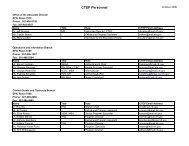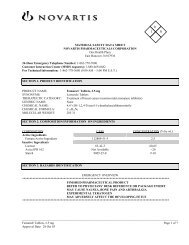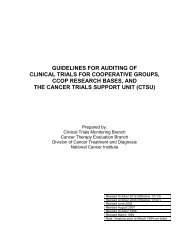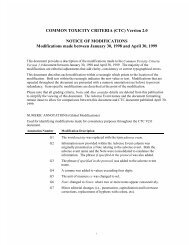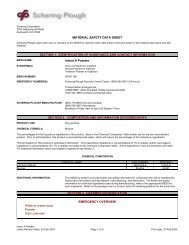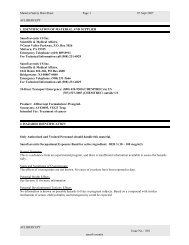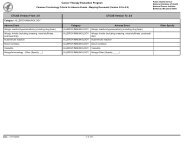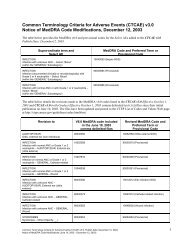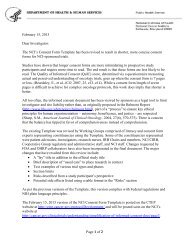NCI National Clinical Trials Network (NCTN) Program Guidelines
NCI National Clinical Trials Network (NCTN) Program Guidelines
NCI National Clinical Trials Network (NCTN) Program Guidelines
You also want an ePaper? Increase the reach of your titles
YUMPU automatically turns print PDFs into web optimized ePapers that Google loves.
PART 1: Overview of <strong>NCTN</strong> <strong>Program</strong> Section I – Description of Essential Features & Key Components<br />
awards. Review of research project requests for use of biospecimens banked from <strong>NCTN</strong> trials is also<br />
administered by DCTD through the <strong>NCTN</strong> <strong>Program</strong>. The infrastructure to support banking of the<br />
biospecimens collected from <strong>NCTN</strong> trials is funded and administered through a separate U24<br />
Cooperative Agreement award.<br />
For information on this U24 Cooperative Agreement award mechanism administered by the Cancer<br />
Diagnosis <strong>Program</strong> (CDP) in DCTD, see RFA-CA-09-504 entitled “Support for Human Specimen Banking<br />
in <strong>NCI</strong>-Supported Cancer <strong>Clinical</strong> <strong>Trials</strong>” at http://grants.nih.gov/grants/guide/rfa-files/RFA-CA-09-<br />
504.html. These biological specimen banks function under the rules developed for this U24<br />
Cooperative Agreement and the funding provided by the U24 Cooperative Agreement award is<br />
intended to support the activities necessary to operate a well-developed bank.<br />
The range of activities that can be covered under the Human Specimen Banking U24 awards includes<br />
support and training of staff to collect and ship biological specimens from the collection sites to the<br />
central banks, to oversee receipt of specimens, and to process specimens at the central bank, including<br />
conducting pathologic review and providing histology services. The funding can also cover costs for<br />
equipment and supplies, including shipping materials and shipping costs, storage costs (such as liquid<br />
nitrogen for freezers) and costs for informatics to track specimens, as well as miscellaneous costs such<br />
as travel to required meetings and maintenance contracts and subcontracts to participating<br />
institutions. Additional support can be obtained to cover some of the costs associated with review of<br />
requests for specimens and data and retrieval and shipment of specimens to researchers as well as<br />
return of blocks to the collecting institutions for patient care or legal requirements. The costs of<br />
organizing or operating data centers beyond those incremental costs directly associated with<br />
transmission of data related to operation of the banks are not covered by this funding mechanism.<br />
A <strong>Network</strong> Group may request funding under the <strong>NCTN</strong> <strong>Program</strong> to cover costs for staff/personnel at<br />
the Operations Center and Statistics and Data Management Center to coordinate activities with the<br />
associated tumor banks for its clinical trials.<br />
7.2 <strong>NCI</strong> Community <strong>Clinical</strong> Oncology <strong>Program</strong>s (CCOPs) & Minority-Based CCOPs (MB-CCOPs)<br />
The Community <strong>Clinical</strong> Oncology <strong>Program</strong> (CCOP) is a network funded by the <strong>NCI</strong> Division of Cancer<br />
Prevention to support testing and validation of medical interventions against cancer, and for delivering<br />
the benefits of scientific discovery to the public and community physicians. The network increases<br />
involvement of community oncologists and other health professionals in <strong>NCI</strong>-approved clinical trials as<br />
full research partners; improves the quality of cancer care in local communities by disseminating<br />
research findings; and boosts participation of minority and underserved populations in cancer clinical<br />
trials.<br />
The CCOP <strong>Network</strong> was created in 1983 as a national mechanism for community-based physicians to<br />
partner with academic investigators. The primary goal was to accelerate implementation of <strong>NCI</strong> clinical<br />
trials for cancer prevention, control and treatment. The Minority-Based CCOP program started in 1990<br />
as a companion mechanism to reach areas with large minority populations.<br />
Both CCOP and MB-CCOP institutions participate in the <strong>NCTN</strong> <strong>Program</strong>’s clinical treatment and<br />
advanced imaging trials through their membership in particular <strong>Network</strong> Groups.<br />
More information on the CCOP <strong>Network</strong> is available at: http://dcp.cancer.gov/programsresources/programs/ccop<br />
and on the MB-CCOP <strong>Network</strong> at:<br />
http://ncccp.cancer.gov/Related/MBCCOP.htm.<br />
7.3 <strong>NCI</strong> Cancer <strong>Trials</strong> Support Unit (CTSU)<br />
The Cancer <strong>Trials</strong> Support Unit (CTSU) is a service of the <strong>National</strong> Cancer Institute’s (<strong>NCI</strong>) Cancer<br />
Therapy Evaluation <strong>Program</strong> (CTEP) developed to provide administrative support for the clinical trials<br />
conducted by the <strong>NCTN</strong> <strong>Program</strong> as well as other <strong>NCI</strong>-supported clinical trial programs.<br />
Page 18 of 241



